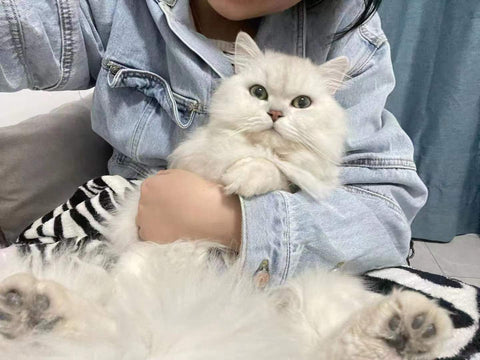
It is widely acknowledged that Feline Infectious Peritonitis (FIP) is triggered by a mutation of the feline coronavirus. Nevertheless, merely carrying the coronavirus does not inevitably imply that a cat will develop FIP. The majority of cats carry the coronavirus, yet only a minuscule 0.3% of them will progress to FIP.
Cat Parents Must Be Vigilant in Prevention: FIP, a Menace to Cats

The feline coronavirus is highly contagious and is predominantly disseminated through fecal-oral routes. Surveys indicate that 25% – 40% of pet cats and over 80% of cats in large catteries and multi-cat households are carriers of the coronavirus. This implies that in multi-cat settings, the probability of cats contracting the coronavirus and subsequently developing FIP is significantly elevated. The following categories of cats are more prone to FIP, and preventive measures should be diligently implemented:
Kittens: Kittens under the age of 2 years are particularly susceptible to FIP, with an infection rate surpassing 75% among all FIP cases. Kittens have restricted exposure to the outside world, making them more vulnerable to stress-triggering circumstances such as moving, undergoing spaying/neutering, encountering strangers, or being exposed to fireworks.
Purebred Cats: Purebred cats typically exhibit marginally lower immune resistance compared to domestic shorthairs. Furthermore, the majority of purebred cats in catteries are bred in large-scale facilities where they are housed in crowded conditions, heightening their exposure to the coronavirus and the risk of developing FIP.
Stray Cats: A considerable number of stray cats are forsaken by their owners due to their young age or illness, compelling them to endure harsh living circumstances. Stray cats are more inclined to various diseases, including FIP.
Senior Cats: Much like humans, as cats advance in age, their immune system gradually weakens, rendering them more susceptible to virus mutations that can potentially result in FIP.
In essence, cats with compromised immune systems are more prone to FIP. Hence, it is of paramount importance to fortify their immunity to prevent FIP. Here are several professional suggestions for enhancing your cat’s immune system:
A Well-Balanced Diet: Cats are strict carnivores, and cat owners should guarantee an adequate intake of high-quality protein. Relying solely on commercial cat food might lead to nutritional deficiencies. Incorporating fresh meats like chicken breast, beef, or fish into their diet is beneficial. Additionally, consider including nutritional supplements, canned food, and cat treats.
Minimizing Stress in Daily Care: Cats are extremely sensitive creatures and prone to stress. Cat owners should refrain from intentionally frightening their cats, and avoid exposing them to videos or pranks that might startle them. During unavoidable situations such as moving, boarding, spaying/neutering, bathing, or vaccination, cat owners should adopt protective measures and provide familiar individuals or objects to comfort their cats.
By concentrating on these preventive measures and adhering to professional advice, cat parents can effectively diminish the risk of FIP and safeguard the well-being of their feline companions. Remain vigilant and take proactive steps to safeguard your cat’s health and happiness.
한글 번역문:
고양이 전염성 복막염(FIP)은 고양이 코로나바이러스의 돌연변이로 인해 발생한다는 것은 널리 알려져 있습니다. 그러나 코로나바이러스를 보유하고 있다고 해서 반드시 고양이가 FIP에 걸리는 것은 아닙니다. 대부분의 고양이는 코로나바이러스를 보유하고 있지만 단지 0.3%만이 FIP로 진행됩니다.
고양이 부모님들은 예방에 주의해야 합니다: 고양이에게 위협적인 FIP
고양이 코로나바이러스는 매우 전염성이 강하며 주로 대변-구강 경로를 통해 전파됩니다. 조사에 따르면 25%-40%의 반려 고양이와 80% 이상의 대형 고양이 사육장 및 다수의 고양이가 있는 가정의 고양이가 코로나바이러스를 보유하고 있습니다. 이는 다수의 고양이가 있는 환경에서 고양이가 코로나바이러스에 감염되고 이후 FIP로 발전할 가능성이 현저히 높다는 것을 의미합니다. 다음과 같은 유형의 고양이는 FIP에 더 취약하며 예방 조치가 필요합니다:
키튼: 2세 미만의 키튼은 FIP에 특히 취약하며 모든 FIP 사례 중 75% 이상의 감염률을 보입니다. 키튼은 외부 세계에 대한 노출이 제한되어 이사, 중성화/거세, 낯선 사람과의 만남 또는 불꽃놀이에 노출되는 등 스트레스를 유발하는 상황에 더 취약합니다.
순종 고양이: 순종 고양이는 국내 단모종에 비해 면역 저항력이 약간 낮습니다. 또한 대부분의 순종 고양이는 대형 사육장에서 사육되어 밀집된 환경에 있기 때문에 코로나바이러스에 대한 노출과 FIP 발병 위험이 증가합니다.
길 잃은 고양이: 많은 길 잃은 고양이는 어린 나이 또는 질병으로 주인에게 버려져 가혹한 생활 환경에 직면합니다. 길 잃은 고양이는 FIP를 포함한 다양한 질병에 더 쉽게 걸립니다.
노령 고양이: 인간과 마찬가지로 고양이가 나이가 들면 면역 시스템이 약화되어 바이러스 돌연변이에 더 취약해져 FIP로 이어질 수 있습니다.
본질적으로 면역 시스템이 약한 고양이는 FIP에 더 취약합니다. 따라서 FIP를 예방하기 위해 면역력을 강화하는 것이 매우 중요합니다. 고양이의 면역력을 향상시키기 위한 몇 가지 전문적인 제안은 다음과 같습니다:
균형 잡힌 식단: 고양이는 육식 동물이며 고양이 주인은 충분한 양질의 단백질 섭취를 보장해야 합니다. 상업용 고양이 사료에만 의존하면 영양 결핍이 발생할 수 있습니다. 가슴살 닭고기, 쇠고기 또는 생선과 같은 신선한 고기를 식단에 포함시키는 것이 도움이 됩니다. 또한 영양 보충제, 캔 음식 및 고양이 간식을 포함시킬 수 있습니다.
일상적인 관리에서 스트레스 줄이기: 고양이는 매우 민감한 동물이며 스트레스를 쉽게 받습니다. 고양이 주인은 고양이를 의도적으로 놀라게 하지 말아야 하며 놀라게 할 수 있는 비디오나 장난을 피해야 합니다. 이사, 임시 보호소에 맡기기, 중성화/거세, 목욕 또는 예방접종과 같은 불가피한 상황에서 고양이 주인은 보호 조치를 취하고 친숙한 사람이나 물건을 제공하여 고양이를 안심시켜야 합니다.
이러한 예방 조치에 집중하고 전문적인 조언을 따르면 고양이 부모님은 FIP의 위험을 줄이고 고양이 친구들의 웰빙을 보호할 수 있습니다. 경각심을 갖고 적극적인 조치를 취하여 고양이의 건강과 행복을 보호하세요.